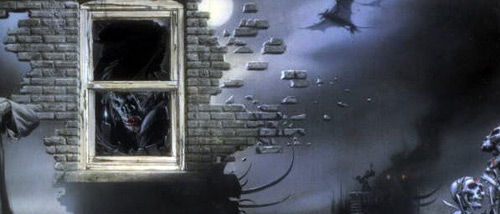
Enviro-Buzz
Join us on the weekend of June 2–4 as we attempt to disentangle politics and opinion from the science about our planet’s health. Please note that Sunday’s optional geology tour is now sold out! Register soon, and participate in the dialogue:
Help us spread the word: Post the conference poster in your school, lab, office, or favorite café. With your help, we can make this the liveliest event we’ve ever held!

upcoming lecture at Caltech
Genes in Conflict
The Biology of Selfish Genetic Elements
with Dr. Robert Trivers
Sunday, May 7th, 2 pm
Baxter Lecture Hall, Caltech
Time magazine called Robert Trivers one of the top 100 thinkers and scientists of the 20th century. His latest book, Genes in Conflict, is being hailed by scientists as the most important synthesis in evolutionary genetics of the last half century.
In evolution, most genes survive and spread within populations because they increase the ability of their hosts (or their close relatives) to survive and reproduce. But some genes spread in spite of being harmful to the host organism — by distorting their own transmission to the next generation, or by changing how the host behaves toward relatives. As a consequence, different genes in a single organism can have diametrically opposed interests and adaptations. In this lecture, based on the book, Trivers shows that selfish genes are a universal feature of life with pervasive effects, including numerous counter-adaptations. Their spread has created a whole world of socio-genetic interactions within individuals, usually completely hidden from sight.
Dr. Trivers is Professor of Anthropology and Biological Sciences at Rutgers University and the author of the authoritative texts Social Evolution and Natural Selection & Social Theory. He pioneered the scientific study of cooperation and reciprocal altruism.

ABC show Wife Swap
looking for a skeptical family
The Skeptics Society offices were contacted by the ABC television series Wife Swap in search of a skeptical family in which, presumably, a skeptical wife would be swapped with a non-skeptical wife (however that is defined). In any case, the producer writes:
Ideally, the family would be married with kids over the age of 6, with huge personalities and a dynamic outlook. Someone who would be gung ho for the experience of a lifetime! A skeptic can take many forms and I think they could bring a new outlook to an otherwise closed minded family. Also, not that money is an incentive, there is a $20,000 honorarium offered to the family that is selected! Please feel free to contact me for more information on how to apply for the show today!
contact:
Daniel Markell, Casting Producer Wife Swap212-404-1441
[email protected]
In this week’s eSkeptic, Jason Colavito comes to the rescue of fiction with a skeptical defense of television shows that incorporate the supernatural. Jason Colavito is a freelance writer based in Albany, NY, and is a regular contributor to eSkeptic. His new book, The Cult of Alien Gods: H.P. Lovecraft and Extraterrestrial Pop Culture, will be published next month by Prometheus Books.

closeup from the cover of Bloodcurdling Tales of Horror and the Macabre by H.P. Lovecraft
A Skeptic’s Defense
of Supernatural Television
by Jason Colavito
The supernatural took over U.S. television this year in the wake of the success of ABC’s Lost. Programs about psychic detectives, alien invaders, monster hunters, and mysterious creatures proliferated on American airwaves, and a wary public braced for a science fiction renaissance rivaling only crime-based television in the number of prime time hours devoted to it.
This invasion of paranormal programming prompted immediate cries from television critics that the shows’ monsters were television’s way to explore the aftermath of the War on Terror. Skeptics countered that the success of otherworldly shows indicated that broadcasting had slipped back into a quagmire of irrationalism, posing a danger to America and civilization as we know it.
Purdue University communications professor Glenn Sparks sent out a press release warning that this fall’s television shows “could encourage people who can least afford it to start spending money on psychics.” Sparks also warned that teenagers were susceptible to the shows’ pernicious influence, and he said “networks should consider posting disclaimers about the reality of the shows.”1
Many skeptics who issue such dire warnings and oppose televised supernatural fiction often engage in uncritical and fallacious thinking that undercuts their rationalist message. Attacking these television shows, or even the idea of supernatural fiction in general, risks insulting the audience skeptics wish to reach, and it suggests an elitist, condescending attitude that continues to give skeptics a bad name.
British television critic Ian Bell was particularly scathing in his review of NBC’s Medium, a drama about a psychic consultant, based in part on alleged real-life psychic Allison DuBois, calling the show “hogwash”: “In my world,” Bell wrote, “there is a real and growing problem caused by the bizarre things ordinary Americans are, apparently, prepared to believe.” He did, concede, though, that “it’s only TV.”2 Skeptical Inquirer’s Joe Nickell also blasted the show because it “shamelessly touted” DuBois as though she were actually able to psychically solve crimes.3
Let us begin by dispensing with the caveats. First, Medium, along with Ghost Whisperer on CBS, are both based on supposedly true stories. Skeptics are right to attack these programs for falsely claiming some kind of truth. Second, many of these shows are not very good — based on their merits as drama, not as science. Others are excellent, like Lost and the WB’s Supernatural — probably the purest and best-made horror series on network television. But too many skeptical critics question the very right of fictional programs to include supernatural elements, as though their existence were an affront to science and reason.
Here’s the problem:
First, such complaints fuel the image that skeptics are priests in the temple of reason condescending to average Americans (and to fellow skeptics who enjoy supernatural fiction). It gives the appearance that skeptics believe viewers of these programs are ignorant, stupid, or too enthralled by the flashing pictures on the idiot box to differentiate between news and drama. It is one thing to point out that such things are not “real;” another to appear to tell viewers they are less worthy than the austere rationalists who would never indulge in irrational entertainment.
Second, the reasoning behind these criticisms is flawed. Supernatural dramas, the argument goes, shouldn’t exist because the supernatural is unreal. But, then, what is the purpose of fiction? All fiction is inherently unreal, as it is stories of things that did not happen. If the only appropriate topics for fiction are things that are possible, then why does fiction exist at all? If we condemn storytelling to the realm of the real, then storytelling is robbed of the very elements that make it more than simply history — the ability to manipulate time and space and the possible and impossible to create compelling stories that reach toward higher truth. If Lost does this and Medium does not, this is where critical discernment — not scientific condemnation — come into play.
Lastly — and my personal pet peeve — is that the skeptical criticism only extends to shows that trend toward horror and not pure science fiction. Obviously this is because many skeptics are scientists and have an affinity for sci-fi, but in the realm of what is real and what is science fact, extraterrestrials, warp drives, and galaxies far far away are every bit as unproven as Gothic horrors. ET may be slightly more scientifically probable than ghosts, but neither is currently known to exist. And before critics complain that Star Trek never led anyone down the garden path, let’s not forget the Heaven’s Gate cult watched Star Trek religiously and hoped to beam up to the waiting aliens after their 1997 mass suicide. This proves only that disturbed people will fixate on whatever pop culture throws at them, supernatural or not.
It is possible for skeptics to watch and enjoy supernatural horror because since the dawn of time stories have always been about more than just the plausibility of their plots. The great horror author H.P. Lovecraft, himself an ardent materialist, atheist, and skeptic, loved supernatural horror and wrote the book on it — Supernatural Horror in Literature. He recognized the “genuineness and dignity of the weirdly horrible tale” against those who call for a “didactic literature to uplift the reader toward a suitable degree of smirking optimism.”4
If a materialist like him could love a good ghost story, why can’t we love Supernatural? After all, there is nothing inherently “better” about non-supernatural stories. Who among us can say that as preposterous as ghost whisperers are that they are any more preposterous than the plot of The OC? That’s why they call it “fiction.”
References
- “Professor: TV Shows May Tune Our Belief in the Supernatural.” 2005. AScribe Newswire, September 6.
- Bell, I. 2005. “The Psychic Who Prompted a Mass Superstition.” The Herald, September 14.
- Nickell, J. 2005. “The Case of the ‘Psychic Detectives.’” Skeptical Inquirer, July–August, 16–19.
- Lovecraft, H.P. 2000. The Annotated Supernatural Horror in Literature. Ed. S.T. Joshi. New York: Hippocampus Press, 21.











